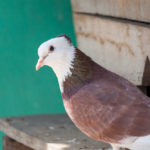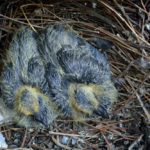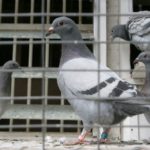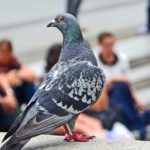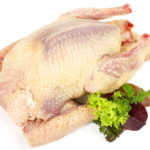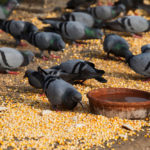Whether you’re surrounded by pigeons in your local park or you happen to have some tame pigeons in a coop in your yard, you should know the right food to give them otherwise you could possibly give them something poisonous.
Considering pigeons spend a lot of time around humans in busy environments picking leftover crumbs and food off the floor, you’d think they’d be accustomed to our diets by now.
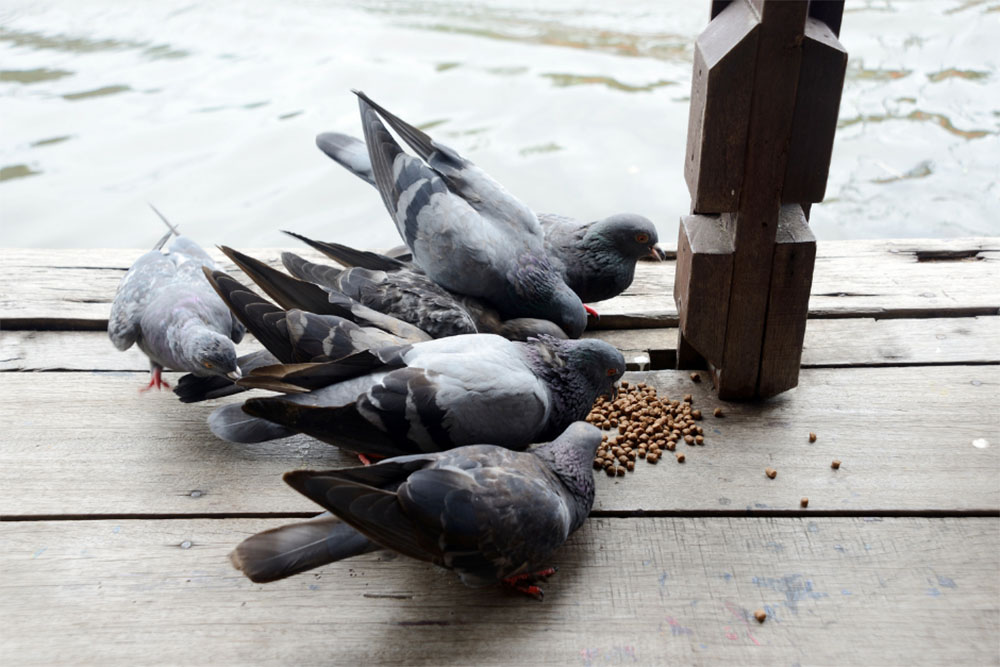
However, what do pigeons like to eat and what food is good for them?
We’ll be answering these questions and more to give you a better understanding in this article.
What Should Pigeons Eat?
Pigeons are predominantly herbivores, but they are partial to things like insects, worms, and snails occasionally when their usual food is not available.
Many people associate bird diets with picking worms out of the ground or eating a ton of bugs, but this is mainly untrue and pigeons will normally only eat insects during certain times of the year.
On the whole, a pigeon’s diet can be made up of wheat, seeds, corn, berries, greenery, and other fruits but their favorite food is probably grains and seeds, which is why most of the bird feed you find in pet stores or garden stores is predominantly seed or grain-based.
When the breeding season comes around in the wild (mainly in the spring and summer), pigeons will seek out insects as they contain high protein and fat contents which are great nutrients to be able to successfully make a baby.
If you’re the proud owner of a few pigeons, then you’ve got the responsibility to ensure they have a diverse, balanced, and healthy diet to keep them happy and healthy in your home.
Unlike in the wild, where they can find their own foods and create a balanced diet for themselves, you’ll need to do it for them.
Try to give them a balance of seeds, grains, vegetables, and fruits and give a balanced amount.
For extra protein and fats if you plan to breed your pigeons, feed them earthworms from your lawn or buy a container from the pet store.
In urban areas, where pigeons freely, they have adapted their diets to be able to survive in these busy areas.
Unlike pigeons in the countryside, they do not have as much access to grains, fruit, berries, and greenery and have had to resort to other foods to feed themselves.
This means you’ll often find pigeons in cities, picking at food such as meat, pasta, fish, and even candy on the ground just to get a good meal.
Not all of these foods are suitable for pigeons, but due to evolution and adaptation, they have managed to survive and continue to feed off these things.
It is not recommended to feed the above foods to pigeons that you keep at home as their diets will be a lot more limited and eating anything unsuitable could be fatal to them.
One thing that surprises many, if not most people, is that pigeons eat grit as well to aid with their digestion, but we’ll be covering that further down.
How Do Pigeons Eat?
Whilst this may not be the question on everyone’s tongue, it’s a very valid and interesting question that needs to be answered to help you understand what you can feed your pigeon.
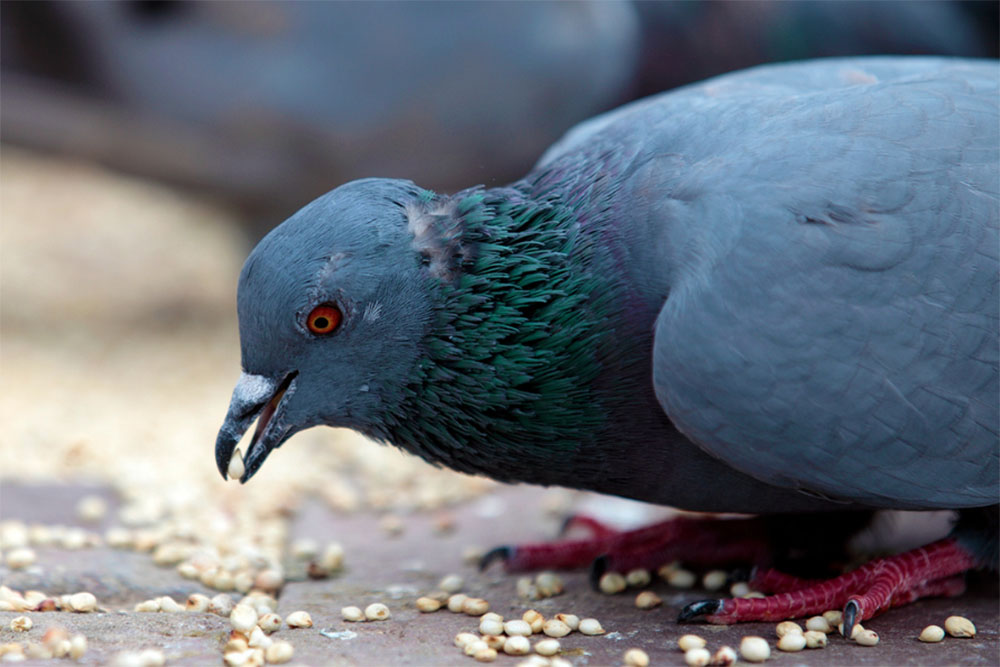
Like all birds, pigeons do not have any teeth and therefore cannot chew and break down food before they swallow so the food they eat will need to be swallowed whole.
This is why you’ll need to be careful with the size of the foods you give your pigeons.
However, once a pigeon eats something, it doesn’t immediately go down to its stomach as it does with humans.
Instead, the food gets stored at the back of their throat (called the crop) before it moves down into their digestive system.
You may be questioning how these pigeons don’t get indigestion by swallowing their food whole, but there is a solution to aid with a pigeon’s digestion and that is grit, pebbles, or stones.
You might have already caught sight of a pigeon picking at stones and eating them from the ground, this is not because they’re starving hungry but because they use them to help grind down the food they eat through muscular contractions.
So really, the stones/grit and the muscles are chewing the food for the bird so they don’t have bad digestive problems.
It’s easy for wild pigeons to find stones or grit to store in their gizzard to help them break down any food they may find.
Although, it’s not as easy for pigeons who are being cared for by owners in a coop.
Owners of domestic pigeons will need to provide grit after every meal and also plenty of fresh water to help with digestion if they are going to feed their pigeons larger foods like fruits, berries, or greenery. You can buy pigeon grit from the pet store in a large bag.
If you’re going to feed your domestic pigeons small items like corn, seeds, and grains then there won’t be a huge need for you to give your pigeons grit after every meal.
What Do Pigeons Drink?
Pigeons only drink water and you should always provide domestic pigeons with fresh water every day that they can use to drink or even dampen their feathers to preen themselves.
Baby pigeons (chicks) will not need fresh water until they are adult pigeons as they get a high water content from drinking the crop milk from the parents when they’re young and then will eventually get regurgitated food from the parents which will have a lot of water content.
The pigeon’s drinking process differs from that of a normal bird. Other birds will fill their beaks up with water and then tilt their head back to allow the water to travel down their throat.
However, pigeons dip their beak into the water and then suck the liquid up into their throat even whilst their head is still tilted down into the water.
This is why it’s better to have water bowls placed around your bird coop instead of having water feeders as your pigeons will need to be able to dip their beak into the water to drink.
Can Pigeons Eat The Same Foods That Humans Do?
As we mentioned, pigeons have come a long way and managed to adapt their lives and diets to live amongst humans in busy urban areas, so much so that they can eat things like meat, fish, eggs, and even dairy without having any stomach complications afterward.
These birds are opportunists and will eat whatever they can get their beaks on, especially out in the wild.
However, domesticated pigeons will need more regiment when it comes to their diet and it should be mainly made up of seeds, grains, berries, or vegetables.
You’re welcome to give your pigeons some of the healthy foods that you eat as well, even if they haven’t tried it before, however, we’d stay away from processed foods or rich food like meat or dairy if you want to avoid any stomach problems.
If you’re one of those owners who can’t resist treating their birds every once in a while, they make sure you do so in small portions and moderation as you don’t want your pigeons to get a taste for human food and begin refusing their bird feed.
What is more, pigeons can easily put on weight when overconsuming human food.
What Food Should You Not Feed A Pigeon?
Whilst some pigeons (mostly urban ones) can stomach a versatile diet, there are certain no-no foods that you should never feed a pigeon, especially if you don’t want them to become ill.
Bread
You may often see members of the public feeding little bits of bread to ducks by the pond or even pigeons in your local park, however, this is generally not recommended, at least not, all the time anyway.
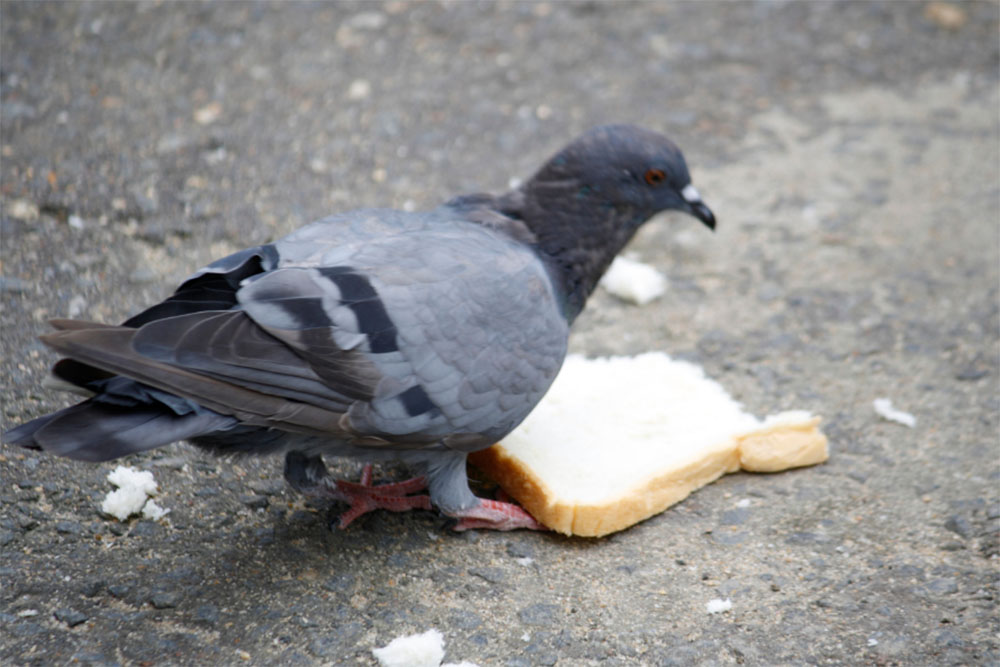
It doesn’t contain the vital nutrients their bodies need and it can also cause blockages in their little bodies, especially if you don’t break it down.
Avocados
Whilst what seems like the entirety of western civilization is crazy about avocados, pigeons certainly are not as they are poisonous to them.
Avocados contain a chemical called persin which is highly toxic for birds and can cause fluid build-up in the liver and lungs, sometimes leading to organ failure.
Chocolate
Chocolate is a very common intolerance for most animals and the same goes for pigeons.
Whilst they’ll happily peck at chocolate crumbs on the floor, the aftermath won’t be such a happy situation to deal with.
Chocolate contains theobromine which can trigger sickness, seizures, diarrhea, and even death if eaten in large doses.
Salty Foods
The pigeon’s kidney is not built to withstand salty foods like a human kidney is and even the smallest quantity of salted food can be toxic for a pigeon.
Do not ever give your pigeons any sort of salted or salty processed food and if your pigeon starts displaying concerning symptoms after eating salty foods you should take them to a vet immediately.
Apples
The fruit of apples are good for your pigeons to eat, there is a chance they could’ve come into contact with pesticides whilst being grown which will be poisonous for them.
The seeds inside an apple contain cyanide which is also toxic for pigeons, so generally, apples are typically avoided within a pigeon’s diet.
Other fruits that also contain cyanide seeds are peaches, cherries, apricots, and pears.
Sugary Drinks
We’re not sure why you’d even be giving your pigeons sugary drinks like soda, but just to clarify, you shouldn’t be doing it.
Pigeons have bad reactions to drinks that are high in sugar and can cause them to become hyperactive and can even lead to diabetes.
Mushrooms
Mushrooms are known to cause digestive problems within all sorts of birds and some components of mushrooms can even cause liver failure so it’s best to avoid them.
Caffeine
We know you’re not going to actively give your pigeons a cup of joe, but if you do happen to be cleaning out their coop whilst enjoying a warm cup of tea or coffee, then it may be best to leave it outside the coop in case they dip their beaks in.
Caffeine can cause serious heart problems.
Conclusion
So there we have it, you know the ins and outs of a pigeon’s diet. Some of this information may have not been news to you as a pigeon’s diet is pretty comparable to many other typical birds.
Wild urban pigeons will eat a whole variety of foods, even ones that are unsuitable for them but that’s because their bodies have adapted to this way of living and you should not try to apply this diet to any domesticated pigeon.
As an owner of a domesticated pigeon, you should try to give your birds a healthy and balanced diet and don’t just feed them exactly what they want because they may begin refusing the other foods.
A balanced diet should contain seeds, grains, berries, and vegetables. Whilst it may be tempting to feed pigeons small pieces of bread, it is not recommended as these hold no nutritional value that your pigeon needs to stay active and healthy.
Not only this but bread is also high in calories and overconsumption can lead to pigeons quickly putting on weight.
Before you give a pigeon food that you’ve never given them before, ensure to refer back to this article to confirm it’s not on the list of poisonous foods before you make a drastic mistake.

